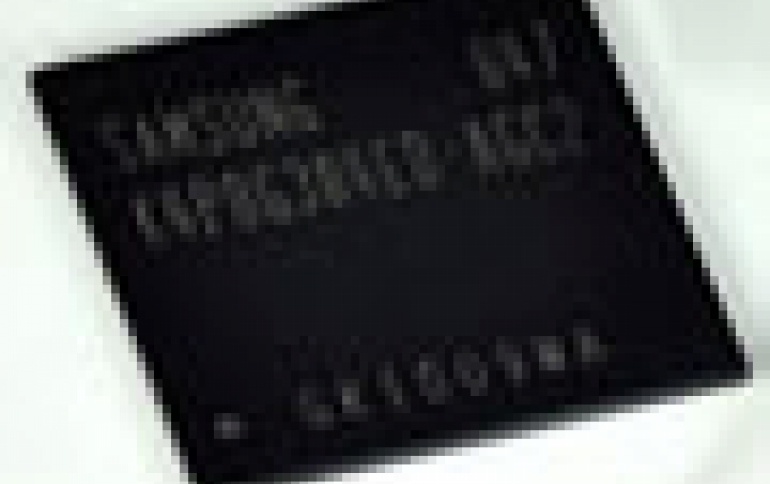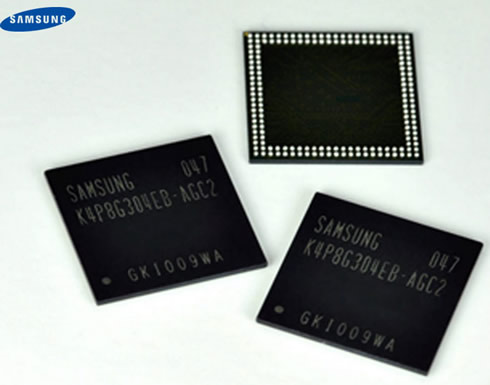
Samsung Develops 30nm LPDDR2 DRAM For Mobiles And Tablets
Samsung Electronics announced today that it has developed and
started sampling the industry's first monolithic four gigabit
(Gb), low power double-data-rate 2 (LPDDR2) DRAM using 30
nanometer (nm) class technology in November.
The chip will be used in high-end mobile applications such as
smartphones and tablet PCs.
"The mobile device market is gaining momentum with the advent of tablet PCs, which is adding significantly to the already surging smartphone segment," said Jun-Young Jeon, vice president, memory product planning team, Samsung Electronics. "Samsung will work closely with mobile device designers to bring high-performance, high-density mobile solutions to market as rapidly as possible."
The new 4Gb LPDDR2 DRAM can transfer up to 1,066 megabits per second (Mbps), which approaches the performance of memory solutions for PC applications. It more than doubles the performance of the industry's previous mobile DRAM - MDDR, which operates between 333Mbps and 400Mbps.
Starting this month, Samsung will begin sampling 8Gb LPDDR2 DRAM by stacking two 4Gb chips in a single package, as it is expected that 8Gb will become the mainstream density for the mobile DRAM market next year.
Until now, an 8Gb (1GB) LPDDR2 DRAM used four 2Gb chips. With the new Green 4Gb LPDDR2, the 8Gb solution offers a 20 percent package height reduction (0.8mm vs. 1.0mm) and will save 25 percent of the power consumed by the previous 8Gb package that used four 2Gb chips. This enables thinner, lighter mobile devices with longer battery life.
Samsung developed a 2Gb LPDDR2 DRAM chip based on 40nm-class technology in February of this year and has been providing that solution since April to cope with the rising demand for advanced mobile DRAMs. With the new 30nm-class 4Gb chip, Samsung will meet the increasing needs for high-density LPDDR2 solutions, as the smartphone and tablet PC markets expand throughout 2011. It also plans to provide 16Gb (2GB) LPDDR2 DRAM by stacking four of the 4Gb chips, as capacity needs continue to grow.
According to iSuppli, shipments of mid to high-end smartphones will increase at about an 18 percent annual rate from 2009 to 2014. This signals dramatic expansion of the mobile DRAM market overall, which may register as much as 64 percent growth in mobile DRAM use during the same period, iSuppli also reported.

"The mobile device market is gaining momentum with the advent of tablet PCs, which is adding significantly to the already surging smartphone segment," said Jun-Young Jeon, vice president, memory product planning team, Samsung Electronics. "Samsung will work closely with mobile device designers to bring high-performance, high-density mobile solutions to market as rapidly as possible."
The new 4Gb LPDDR2 DRAM can transfer up to 1,066 megabits per second (Mbps), which approaches the performance of memory solutions for PC applications. It more than doubles the performance of the industry's previous mobile DRAM - MDDR, which operates between 333Mbps and 400Mbps.
Starting this month, Samsung will begin sampling 8Gb LPDDR2 DRAM by stacking two 4Gb chips in a single package, as it is expected that 8Gb will become the mainstream density for the mobile DRAM market next year.
Until now, an 8Gb (1GB) LPDDR2 DRAM used four 2Gb chips. With the new Green 4Gb LPDDR2, the 8Gb solution offers a 20 percent package height reduction (0.8mm vs. 1.0mm) and will save 25 percent of the power consumed by the previous 8Gb package that used four 2Gb chips. This enables thinner, lighter mobile devices with longer battery life.
Samsung developed a 2Gb LPDDR2 DRAM chip based on 40nm-class technology in February of this year and has been providing that solution since April to cope with the rising demand for advanced mobile DRAMs. With the new 30nm-class 4Gb chip, Samsung will meet the increasing needs for high-density LPDDR2 solutions, as the smartphone and tablet PC markets expand throughout 2011. It also plans to provide 16Gb (2GB) LPDDR2 DRAM by stacking four of the 4Gb chips, as capacity needs continue to grow.
According to iSuppli, shipments of mid to high-end smartphones will increase at about an 18 percent annual rate from 2009 to 2014. This signals dramatic expansion of the mobile DRAM market overall, which may register as much as 64 percent growth in mobile DRAM use during the same period, iSuppli also reported.






















